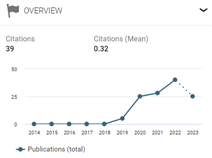Evaluasi implementasi program rumah keluarga sekar kasih dalam perbaikan status gizi di Wilayah Kerja Puskesmas Sekaran
DOI: 10.30867/gikes.v5i3B.1939Abstract
Background: Rumah Keluarga Sekar Kasih has completed the care of 8 toddlers from March 3, 2023, to September 1, 2023. After three months of completion of care, assistance was carried out. It was found that the nutritional status of toddlers based on WAZ was 37.5% underweight and 62.5% normal weight, according to HAZ as much as 62.5% stunting and 37.5% normal, and according to WHZ found 12.5% wasting and 87.5% normal.
Objectives: The purpose of this study was to evaluate the implementation of the Rumah Keluarga Sekar Kasih program in improving nutritional status in the Sekaran Public Health Centre.
Methods: This type of research is qualitative evaluation research with the CIPP method (context, input, process, product). Sampling by purposive sampling and snowball sampling, with a total of 12 informants. Data were collected through in-depth interviews, participatory observation, documentation, and literature study. The study was conducted in March 2024 in the Sekaran Public Health Centre.
Results: The study results indicate that the program implementation has been generally successful, but there are areas that could be improved. These include limited supporting facilities, closed attitudes of some toddlers' families, and a lack of training for program implementers. The program's achievements from March 3, 2023, to March 3, 2024, include 13 toddlers completing treatment. Most underweight toddlers (76.9%) improved their nutritional status, while all toddlers with wasting improved nutrition, and the nutritional status of stunting toddlers did not show significant improvement.
Conclusion: This study concludes that the Rumah Keluarga Sekar Kasih program needs improvement.
Keywords
Full Text:
PDFReferences
Daftar Rujukan
Ahyana, R., Zara, N., & Mardiati, M. (2022). Hubungan Pola Pengasuhan dan Status Sosial Ekonomi Keluarga dengan Kejadian Stunting pada Anak Usia 24-59 Bulan di Wilayah Kerja Puskesmas Muara Satu Kota Lhokseumawe. Jurnal Kesehatan Almuslim, 8(1), 29–40. https://doi.org/10.51179/jka.v8i1.1121
Arini, D., Mayasari, A. C., & Rustam, M. Z. A. (2019). Gangguan Perkembangan Motorik Dan Kognitif pada Anak Toodler yang Mengalami Stunting di Wilayah Pesisir Surabaya. Journal of Health Science and Prevention, 3(2), 122–128. https://doi.org/10.29080/jhsp.v3i2.231
Hasana, D., & Mukarromah, S. B. (2019). The Evaluation of the Success about House Nutrition in Improvement Nutrition Status in Semarang. Public Health Perspectives Journal, 4(2), 94–103.
Kurnianti, D. A. (2022). Evaluasi Program PMT-P Pada Ibu Hamil Kekurangan Energi Kronik di Puskesmas Pekalongan Selatan. Sport and Nutrition Journal, 4(2), 1–14. https://doi.org/10.15294/spnj.v4i2.53852
Labatjo, R., Tumenggung, I., & Bami, M. (2022). Pelatihan Proses Asuhan Gizi Terstandar Bagi Petugas Puskesmas. JMM (Jurnal Masyarakat Mandiri), 6(1), 359. https://doi.org/10.31764/jmm.v6i1.6375
Ludya, M., Herlambang, Y., & Yunidar, D. (2023). Produk Alat Ukur Tinggi dan Berat Badan Pendeteksi Stunting dengan Fitur Hiburan untuk Anak Usia 2-5 Tahun. Productum: Jurnal Desain Produk (Pengetahuan Dan Perancangan Produk), 6(1), 51–62. https://doi.org/10.24821/productum.v6i1.7685
Mulyani, N. S., Fitriyaningsih, E., Al Rahmad, A. H., & Hadi, A. (2022). Peningkatan Pengetahuan dan Sikap Ibu untuk Pencegahan Stunting di Kabupaten Aceh Besar. Jurnal PADE: Pengabdian & Edukasi, 4(1), 28. https://doi.org/10.30867/pade.v4i1.810
Nabila, F. H., & Astuti, N. F. W. (2024). Jurnal Gizi Kerja dan Produktivitas Implementation of a Local Food Supplementation Feeding Recovery Program. 5(1), 92–100.
Prasetyowati, T. A., Yuniastuti, A., & Handayani, O. W. K. (2019). Analisis Aspek Input pada Upaya Promosi Pemberian ASI Eksklusif. Jurnal Litbang: Media Informasi Penelitian, Pengembangan Dan IPTEK, 15(1), 13–26. https://doi.org/10.33658/jl.v15i1.128
Priharwanti, A. (2022). Evaluasi CIPP (Context-Input-Process-Product) Program ASI Eksklusif sebagai Upaya Penurunan Stunting di Bantarbolang Kabupaten Pemalang. PENA, 36(2), 53–54.
Probosiwi, H., Huriyati, E., & Ismail, D. (2017). Stunting dan Perkembangan Anak Usia 12-60 Bulan di Kalasan. Berita Kedokteran Masyarakat, 33(11), 559. https://doi.org/10.22146/bkm.26550
Rahmawati, V. E., Pamungkasari, E. P., & Murti, B. (2018). Determinants of Stunting and Child Development in Jombang District. Journal of Maternal and Child Health, 03(01), 68–80. https://doi.org/10.26911/thejmch.2018.03.01.07
Sugianti, E. (2020). Evaluasi Program Perbaikan Gizi Berbasis Pemberdayaan Masyarakat dalam Pos Gizi di Kabupaten Bojonegoro. Cakrawala: Jurnal Litbang Kebijakan, 14(2), 113–128. https://doi.org/10.32781/cakrawala.v14i2.355
Umami, N. A., & Farida, E. (2022). Evaluasi Program Theurapetic Feeding Center dalam Upaya Penanganan Kasus Gizi Buruk pada Balita di Kabupaten Tegal (Studi Kasus di Wilayah Kerja Puskesmas Bumijawa, Tegal Tahun 2021). Indonesian Journal of Public Health and Nutrition, 2(1), 67–74. https://doi.org/10.15294/ijphn.v2i1.50214
Wahyuningtias, R., & Zainafree, I. (2022). Evaluasi Program Gerakan 1000 Hari Pertama Kehidupan (HPK) dalam Pencegahan Stunting di Wilayah Kerja Puskesmas Bangsri Ii Kabupaten Jepara. Jurnal Kesehatan Masyarakat, 10(2), 172–177. https://doi.org/10.14710/jkm.v10i2.32574
Workie, S. B., Mekonen, T., Mekonen, T. C., & Fekadu, W. (2020). Child Development and Nutritional Status in 12-59 Months of Age in Resource Limited Setting of Ethiopia. Journal of Health, Population and Nutrition, 39(1), 1–9. https://doi.org/10.1186/s41043-020-00214-x
Refbacks
- There are currently no refbacks.














